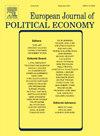One money, one voice? Evaluating ideological positions of euro area central banks
Abstract
We provide new insights into the effectiveness of central bank communication in the euro area relying on a novel methodology. The time-varying text based ideal point model (TV-TBIP) is used focusing on two crucial topics communicated by central bankers, namely price stability and financial stability. The methodology permits identification of the ideological position of the speaker. We find that the ECB transitions between a high ideal point state reminiscent of interventionist monetary policy and their effects on financial markets and a low ideal point state with emphasis on risks to fragmentation from monetary policy and financial stability policies. The individual euro area central banks tend to mirror the ECB’s position which suggests that some specialization/coordination of responsibilities from the communications activities of euro area national central banks takes place. National central banks’ positions change gradually and usually during crisis periods. In contrast, the ECB’s ideological position is very stable. We also conduct several econometric tests that point to national inflation rates influencing ideological positions. Additionally, we find that professional forecasts are responsive to the position taken of central bankers in their speeches.

 求助内容:
求助内容: 应助结果提醒方式:
应助结果提醒方式:


